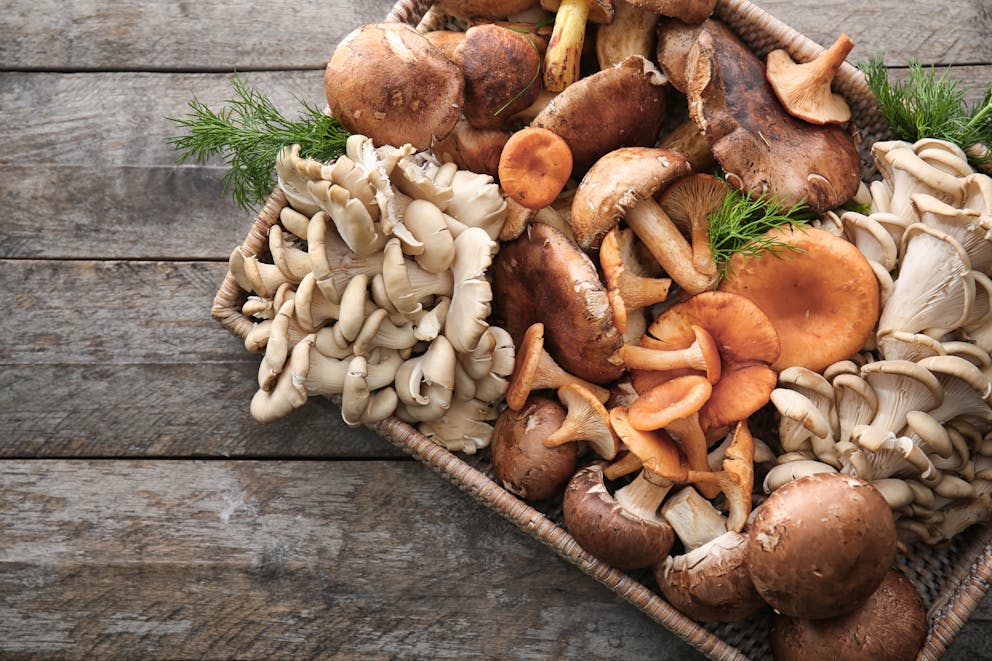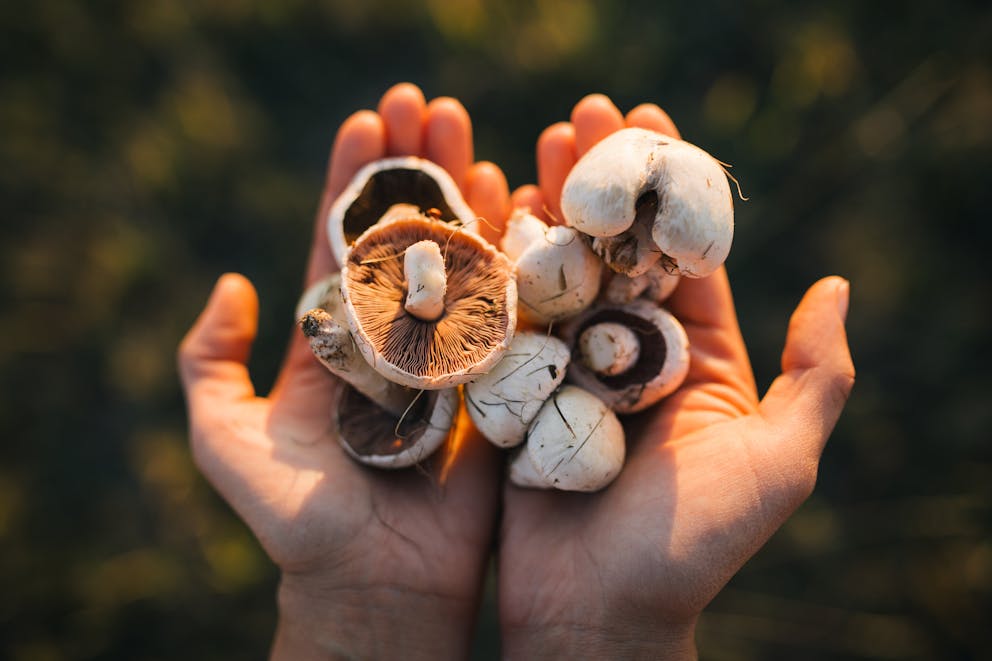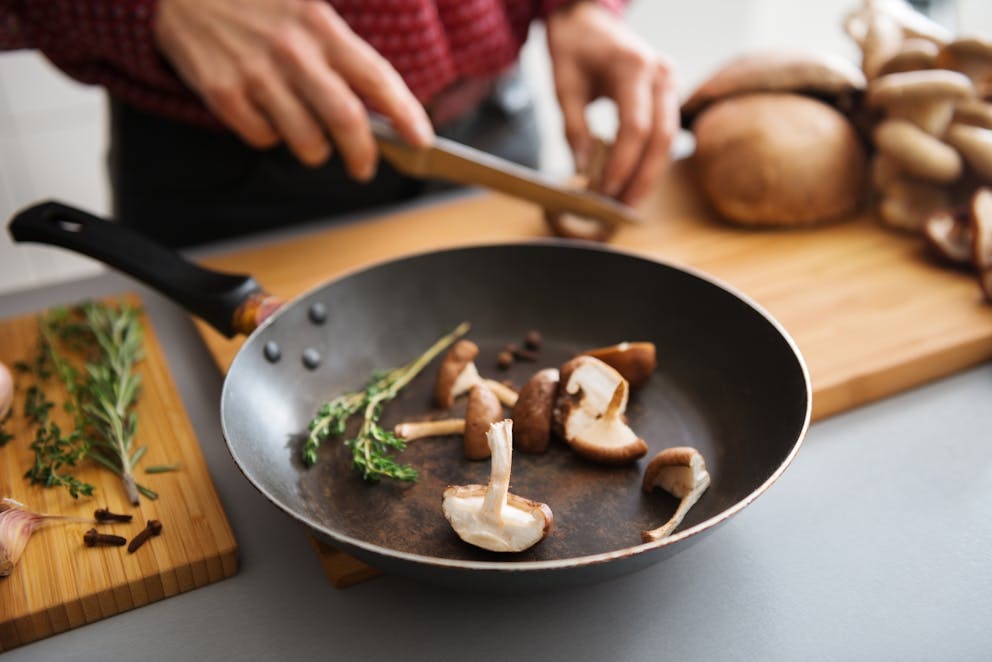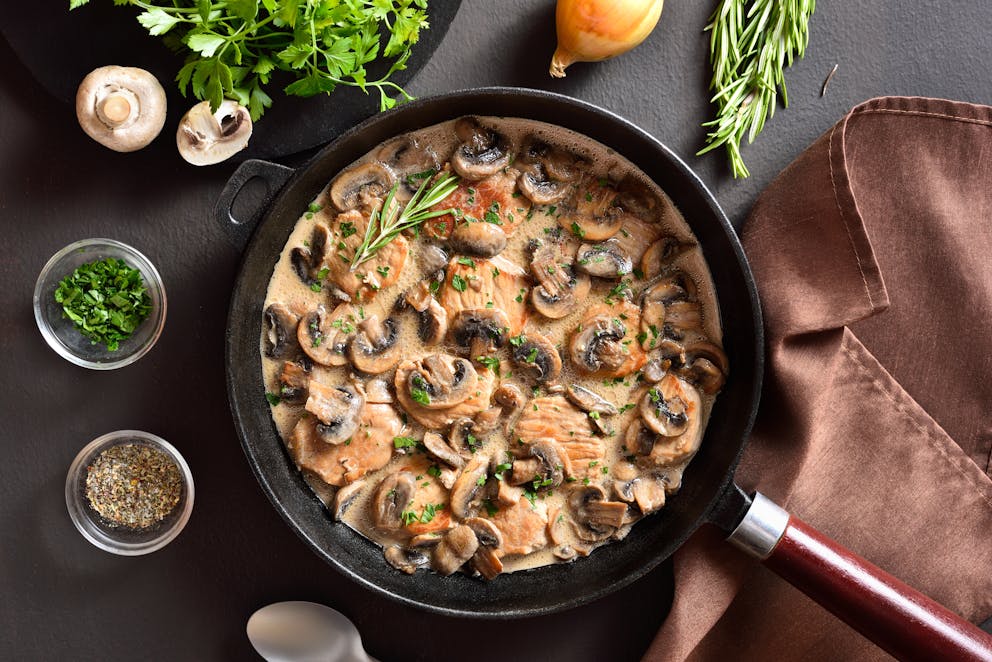Are Mushrooms Keto-Friendly? Benefits of Mushrooms on Keto
Mushrooms offer unique textures and flavors and have been used for culinary and medicinal purposes for centuries. But are mushrooms keto-friendly?
Yes, mushrooms are keto-friendly and have impressive health benefits, which makes them an excellent choice for a nutritious ketogenic diet.
Discover five reasons why you should eat more mushrooms on a low-carb diet.

How many carbs are in mushrooms?
While the exact carbohydrate content of mushrooms depends on the specific variety, mushrooms are generally low in carbs and on the keto food list.
Not only are mushrooms a low-carb food, but they also contain dietary fiber, which explains why most mushrooms have an impressively low net carb count.
Here is the net carb count of common types of raw mushrooms per one cup (100 grams) serving:
White mushrooms (button mushrooms): 1 gram
Portobello mushrooms: 2 grams
Cremini mushrooms: 2 grams
Chanterelle mushrooms: 2 grams
Oyster mushrooms: 3 grams
Shiitake mushrooms: 4 grams
Morel mushrooms: 4 grams
King oyster mushrooms: 5 grams
Watch the video below to learn why you should eat more mushrooms on keto.
Are mushrooms keto-friendly?
Yes, mushrooms are keto-friendly!
Because mushrooms have a naturally low net carb count, they’re on the keto food list and should feature regularly on your keto meal plan.
Most mushroom varieties contain two to four grams of carbs per one-cup serving, which is unlikely to exceed your daily net carb limit or interfere with fat burning.
However, it’s important to check the nutrition labels of pre-packaged mushroom products, such as cream of mushroom soup or stuffed mushrooms, as they may contain wheat flour and other high-carb ingredients that can quickly disrupt ketosis.

Five health benefits of mushrooms
Mushrooms have powerful medicinal properties and have been used for centuries to prevent and manage a wide range of health conditions.
Mushrooms have a unique nutritional profile and are rich sources of bioactive compounds such as beta-glucans, phenolic compounds, and ergosterols, associated with several health advantages.
A study published in Food Science investigated the benefits of mushroom consumption and concluded, “Mushrooms play a vital role in protecting and curing various health problems, such as immunodeficiency, cancer, inflammation, high blood pressure, hyperlipidemia, hypercholesterolemia, and obesity.”
Here are five reasons why you should be eating more mushrooms on keto!
1. Nutritional powerhouses
Mushrooms are rich sources of essential vitamins, minerals, and antioxidants.
Here are some of the top nutrients in mushrooms:
Vitamin B2
Vitamin B3
Vitamin B5
Folate
Selenium
Zinc
Copper
Ergosterols
Phenols
Glutathione
“Some mushroom varieties such as shitake, oyster, and button mushrooms can produce vitamin D when exposed to ultraviolet light,” explains Dr. Berg. “This makes mushrooms one of the few food sources of vitamin D, an essential fat-soluble vitamin crucial for immune function, strong bones, and cardiovascular health.”
2. May lower the risk of cancer
Adding mushrooms to your menu plan can potentially lower your cancer risk.
Research published in The International Journal of Molecular Science found that beta-glucans, a polysaccharide found in many mushroom varieties, stimulate the activity of natural killer (NK) cells.
NK cells play a profound role in cancer prevention by detecting and destroying cells that display abnormal growth patterns, thereby stopping potential carcinogenic growth and lowering the risk of developing cancer.
While shitake, reishi, and maitake mushrooms all contain beta-glucans, evidence suggests that turkey tail mushrooms have potent anti-cancer properties.

3. Support normal brain function
Mushrooms are excellent sources of antioxidants, which may help to protect brain cells from oxidative stress caused by free radicals.
Free radicals are highly volatile metabolic by-products that can cause damage and inflammation to cells and tissues in the central nervous system, linked to neurodegenerative conditions such as dementia and Parkinson’s disease.
Ergothioneine and selenium are potent mushroom-derived antioxidants that deactivate free radicals, which may explain why frequent mushroom consumption has been found to promote normal brain function and cognitive health.
4. Promote a diverse microflora
Mushrooms contain prebiotic substances such as beta-glucans that serve as a fuel source for the beneficial microbes residing in your intestinal tract.
Prebiotics promote the growth and proliferation of diverse gut bacteria needed to prevent the overgrowth of potentially harmful microbes.
A balanced microflora strengthens immune defenses, promotes healthy digestion, and may lower the risk of colon cancer and inflammatory bowel disease.
5. Testosterone-boosting properties
Eating button mushrooms may boost testosterone levels in men.
Button mushrooms have been found to inhibit aromatase, an enzyme that contributes to hormonal imbalances by converting circulating testosterone into estrogen.
Research published in the Journal of Nutrition found that eating button mushrooms can significantly reduce aromatase activity and promote healthy testosterone levels.

How to eat mushrooms on keto
Mushrooms are a delicious and versatile keto-friendly food that adds depth of flavors and a meaty texture to many keto dishes.
Here are some keto mushroom recipe ideas to help you incorporate more mushrooms into your keto diet.
Keto stuffed mushrooms
Mushrooms maintain a firm texture when cooked, which makes mushroom caps ideal for stuffing.
You can stuff mushroom caps with cream cheese, different meats, or your favorite low-carb veggies and sprinkle them with shredded cheddar or parmesan cheese.
Sauteed keto mushrooms
Sauteing or stir-frying mushrooms is incredibly quick and easy.
Simply add mushrooms, butter, and minced garlic to a hot pan and fry until mushrooms are golden brown in color. Add lemon juice, heavy cream, and fresh parsley, and serve alongside zucchini noodles or cauliflower rice for a delicious low-carb meal.
Keto mushroom soup
Mushroom soup has a creamy texture and is the ultimate comfort food.
Saute sliced mushrooms, onions, and garlic in butter or olive oil until softened. Add vegetable or chicken broth and simmer for 20 minutes. Add cream cheese or shredded cheddar cheese and blend until smooth.
Keto mushroom recipes
Here are popular keto mushroom recipes that are low in total carbs:
Keto-sauteed garlic mushrooms
While mushrooms can be consumed uncooked, many individuals are sensitive to raw mushrooms and can develop stomach pains and bloating, and it’s best to always eat mushrooms cooked to avoid gastrointestinal issues.

Key takeaways
Are mushrooms keto-friendly? Yes, mushrooms are an excellent choice for a high-fat diet.
Not only are mushrooms low in carbs, but they’re also rich sources of essential nutrients and potent bioactive compounds with impressive health benefits.
Regularly eating mushrooms can support a healthy intestinal microflora, may boost testosterone, and is linked to a lower risk of cancer and neurodegenerative conditions.
FAQ
1. How many mushrooms can I eat on keto?
Most mushrooms contain between two to four net carbs per one cup (100 gram) serving, making them a low-carb ingredient that you can safely enjoy on keto.
However, it’s important to be aware that mushrooms do contain some carbs and should be included in your daily net carb count to avoid blood sugar spikes, which can interfere with ketosis.
2. What vegetables are off-limits on keto?
Starchy vegetables like beets, potatoes, sweet potatoes, winter squash, and sweet corn are high in total carbs and can quickly push you out of ketosis.
3. Do mushrooms have carbs?
Yes, mushrooms contain some carbs. However, most mushroom varieties are low in carbs and only contain two to four net carbs per one-cup serving.
4. Are mushrooms high in carbs?
Most common mushroom varieties, such as cremini, portobello, chanterelle, and button mushrooms, contain less than three grams of net carbs per one-cup serving.
Shiitake, morel, and king oyster mushrooms have a slightly higher carb count and typically contain four to five net carbs per cup.
5. How many carbs are in mushrooms?
While the exact carb count depends on the specific mushroom variety, most common mushroom types contain less than three grams of net carbs per cup.
6. Can you eat fried mushrooms on keto?
Yes, fried mushrooms are nutritious and keto-approved.
However, remember that mushrooms contain some carbs and should be included in your net carbs count to not exceed your daily carbohydrate limit.
7. Which mushrooms are high in carbs?
Morel, king oyster, and shiitake mushrooms contain around four to five grams of carbs per cup serving, which is a slightly higher carb count compared to cremini, portobello, chanterelle, and button mushrooms.
8. Are sauteed mushrooms high in carbs?
No, sautéed mushrooms are generally low in carbs, making them a suitable choice for a low-carb diet.
9. What’s the best way to eat mushrooms on keto?
There are many ways to enjoy mushrooms on keto, such as sauteed mushrooms, stuffed mushrooms, mushroom casserole, and mushroom soups.
10. Are mushrooms healthy?
Yes, mushrooms are incredibly healthy. Evidence suggests that mushrooms promote brain function and digestive health, may lower inflammation and the risk of cancer, and have been found to boost testosterone.
11. How many carbs are in shiitake mushrooms?
One cup of raw shiitake mushrooms contains four grams of net carbs.
Previous blog
Accidentally Messed Up on Keto? DO THIS
Popular
08/21/2024
55.7K views
02/23/2025
46.8K views
11/18/2024
281.2K views
03/18/2024
11/21/2022




